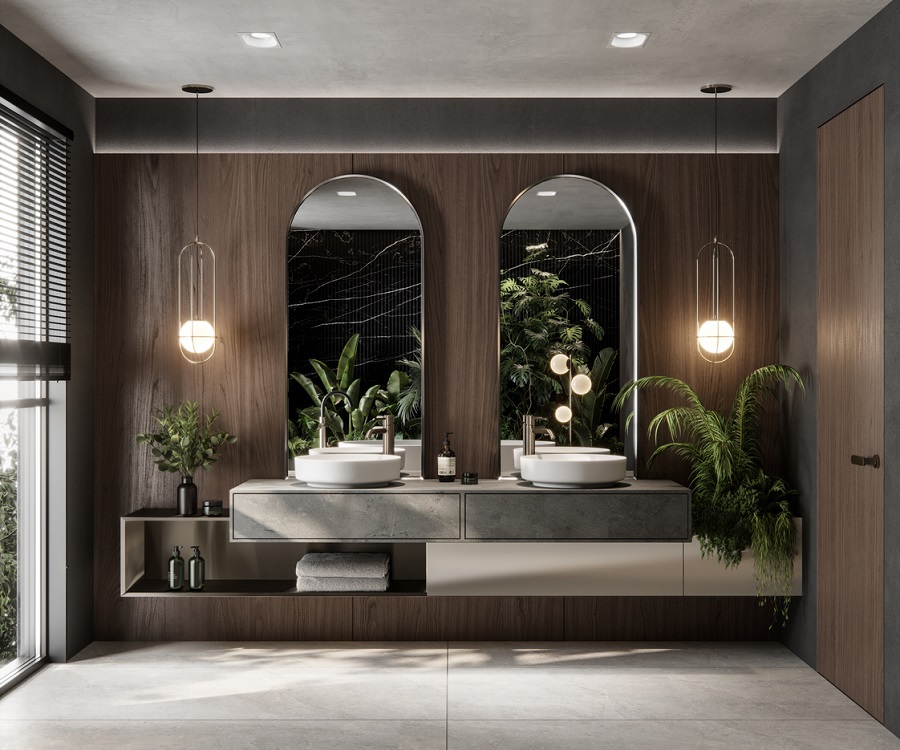
20 Must-Have Luxury Bathroom Accessories
Meta: Luxury bathroom accessories can transform an ordinary space into something truly special. These bathroom accessories can spark the luxury
With so many bathroom floor materials on the market today, which one is the best for your home? Of course, many would argue that porcelain tile is the best material for your floor, as it is durable, aesthetically pleasing, low maintenance, and water resistant. But other options on the market make great additions to your bathroom, so let us explore their pros and cons and see which is the right fit for you.
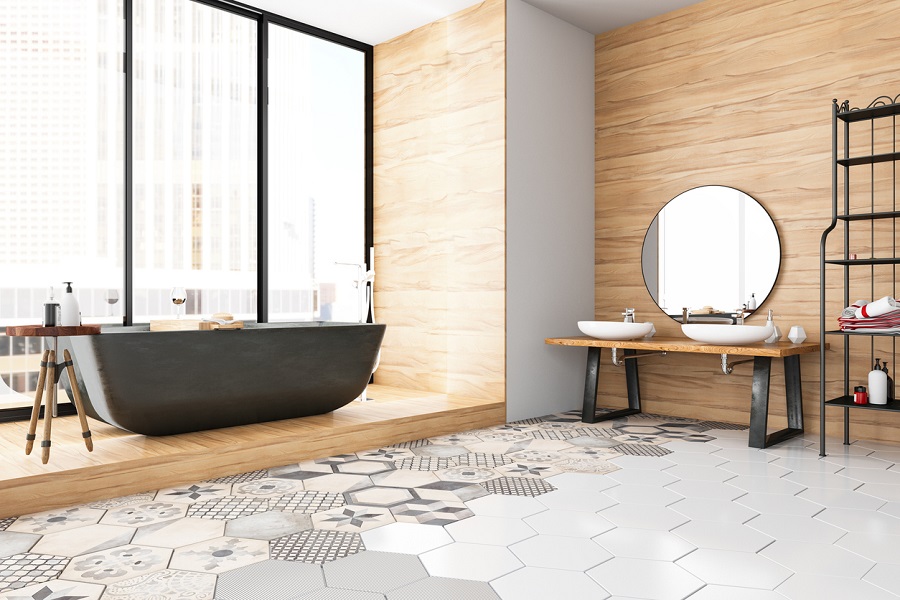
Vinyl flooring is a multi-layered synthetic flooring made from plastic, fiberglass, and PVC materials. This material comes in the form of planks, tiles, or sheets that line your floor. A core layer of material comprises the primary material of the flooring with an image or material layer above it that can mimic a wide variety of looks and materials such as wood or ceramic.
This top layer also protects the sublayers from any superficial damage, water, or stains. As a result, vinyl flooring is water-resistant, has great durability, and can survive heavy wear and tear. The material is comfortable to walk on and has a padded feel with multi-layers underneath, which has soundproofing qualities.
The material is affordable and has a straightforward installation. Contrarily, vinyl flooring cannot be refinished, as the floor must be replaced. It has little resale value and is not environmentally friendly as toxic chemicals are used during manufacturing.
Pros
Cons
Porcelain tile is made by exposing clay to high temperatures until it hardens, resulting in a stronger tile than ceramic and fairly durable. As a result, porcelain has many design options, is durable, water/stain resistant, and low maintenance.
It also absorbs little moisture, is easy to maintain, inexpensive to repair, and is an excellent material for those that want great aesthetics with minimal effort. On the other hand, Porcelain has a high material cost, is heavy, brittle, slippery, and is difficult to install compared to other materials.
Pros
Cons
Ceramic tiles are made using a kiln to heat clay until it hardens, making ceramic tiles softer and less dense than porcelain. The clay used is less refined, resulting in a more porous and less durable material than porcelain, providing a more affordable price tag.
Ceramic tile, when glazed, is water/stain resistant has a large variety of style options, is durable, and is low maintenance.
Conversely, Ceramic tile needs to be sealed and glazed before use; otherwise, the material will absorb water and will require replacing. In addition, the tile can get quite cold, making it uncomfortable to walk on with bare feet, is time-consuming to install with the grout issue, and is quite heavy.
Pros
Cons
Natural stone flooring uses natural stones such as marble, granite, and limestone to cut directly into the tile. This style is incredibly popular because of its natural beauty, high durability, and high resale value to your home.
Stone tile has excellent heat retention and is easy to maintain, replace, and repair. The material is also highly water-resistant, making it ideal for the bathroom. However, getting high-quality material, the cost is not cheap.
Natural stone ranks among the most expensive floor materials, requiring time-consuming installation time. The material is also prone to wear and tear, such as chipping, staining, or cracking. This flooring can eventually break down if natural stone isn’t properly maintained.
Pros
Cons
Binding real pieces make engineered wood of wood, scraps, and shredded fibers to create a product that looks and acts like wood but is more durable. Engineered wood has a plywood base, allowing it to absorb moisture better, but it’s still wood and prone to damage long term. Engineered wood is the best option if you are sold on having wood in your bathroom but expect to replace it regularly.
Pros
Cons
Laminate flooring comprises a multi-layer flooring product that is fused with lamination. The layers include a dense core of plywood or high-density fiberboard. This layer is followed up with a photo-realistic image layer to mimic any material such as wood or stone. The last layer provides a protective layer for the entire material.
Due to the construction method, laminate flooring is highly affordable and easy to install. Since it is meant to mimic other materials, it is also aesthetically attractive with simple maintenance. The drawback to laminate flooring is that it cannot be refinished, requiring wholesale material replacement. In addition, it is not moisture-proof, leading to long-term rot and deterioration if not properly maintained.
Pros
Cons
Stained concrete is a concrete slab that is colored on the surface. The result is an environmentally friendly material, low maintenance, and near-limitless design flexibility and versatility. Since the process is fairly straightforward, stained concrete can be imprinted with a wide range of different color hues to create a custom color for your floor.
In addition to the stylistic flair, it is a low-maintenance material that can weather stains, spills, dirt, and hard impacts. In addition, concrete flooring can be equipped with radiant floor heating, allowing for heated floors. For negatives, concrete floors are very hard, which some may find very uncomfortable, especially for those with small children or the elderly. In addition, concrete flooring is highly susceptible to moisture, requiring a seal to prevent any long-term water damage.
Lastly, the material can develop cracks over time as the entire material will constantly adjust with temperature shifts and the material is difficult to install.
Pros
Cons
Cork flooring is made by using tree bark that is ground up, compressed, and formed into sheets that are bonded with resin. The material is biodegradable, and cork flooring is often made using recycled cork flooring, making it very eco-friendly.
Cork flooring is insulating, lowering heating bills as the material can absorb heat and act as soundproofing. However, cork flooring is not as durable as other floorings, cannot sustain heavy impacts well, and may swell with excessive moisture.
Pros
Cons
Bamboo floor is made by using bamboo stalks to construct planks and flooring. Like most hardwoods, bamboo is highly resistant to moisture, and the material behaves like wood flooring, allowing it to be refinished and maintained similarly. Bamboo is a renewable material that is very environmentally friendly, easy to maintain/clean, can be refinished, and adds to resale value. Contrarily, bamboo flooring can be easily scratched, is not incredibly durable, and is very susceptible to temperature spikes which can cause cracks or material to break down.
Pros
Cons
Waterproofing is an important aspect of selecting your floor. If your flooring is not properly protected, water can enter into any openings and eventually develop into mold, leading to structural damage. Waterproof vinyl, porcelain tile, and waterproof laminate are the most recommended materials due to their resistance to moisture.
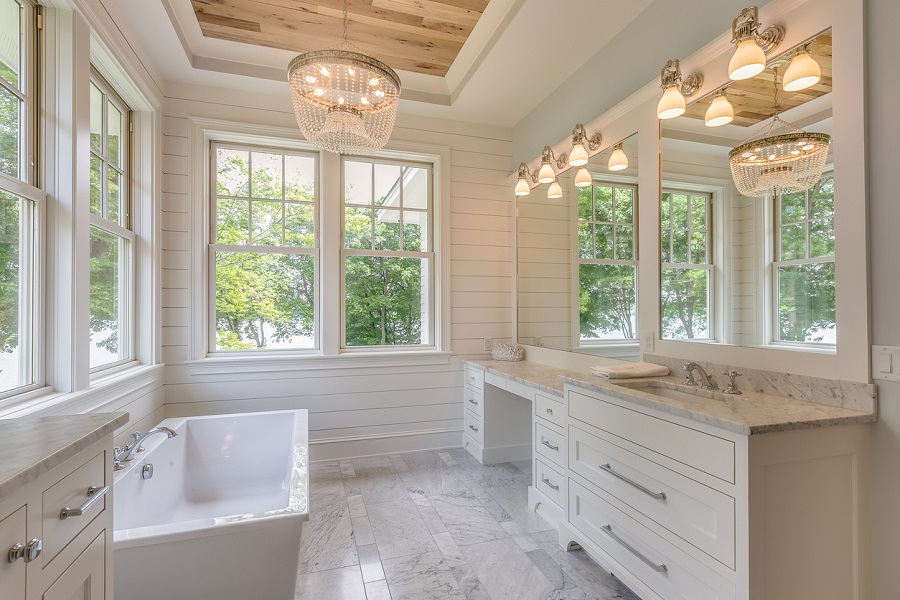
But almost any material can be waterproofed as long as they are properly sealed with silicone. Silicone applies a waterproof seal that covers any cracks or gaps, preventing moisture from entering into your floor.
Your master bath should be stylish and have the highest quality flooring you can provide. Options such as Marble tile and SPC vinyl floors are great as they provide the best waterproof solutions while enhancing your bathroom’s aesthetic. Natural stone is another popular option, as you can further enhance the luxurious feel of the bathroom space.
Guest bathrooms are not as busy as the other rooms, so you can make a statement with your flooring. Utilize luxury or color materials to create unique tile patterns or mosaics. Or, you can use hardwood to create a unique space for your guests and make your home feel more rustic.
High-traffic floors require a durable material that is also low maintenance. Vinyl is a great choice as it is designed for commercial spaces and can take heavy punishment. Alternatively, you have both porcelain and ceramic tiles as they require little maintenance, are waterproof when sealed, and can take a beating as well. Porcelain and ceramic are also much more environmentally friendly than vinyl.
Guest bathrooms are not as busy as the other rooms, so you can make a statement with your flooring. Utilize luxury or color materials to create unique tile patterns or mosaics. Or, you can use hardwood to create a unique space for your guests and make your home feel more rustic.
Small bathrooms require flooring that can withstand humidity but are also comfortable. Ceramic and porcelain tile are great options here, providing a durable material that can be easily installed and is water resistant when sealed.
Kids are messy and are bound to cause spills and splashes, so you need a durable, waterproof material. Vinyl floors provide a heavy-duty option that will age as your children do. Vinyl is moisture resistant and can also weather a great deal of punishment. Alternatively, porcelain or ceramic tile is great for withstanding heavy traffic.
High-traffic floors require a durable material that is also low maintenance. Vinyl is a great choice as it is designed for commercial spaces and can take heavy punishment. Alternatively, you have both porcelain and ceramic tiles, which require little maintenance, are waterproof when sealed, and can take a beating. Porcelain and ceramic are also much more environmentally friendly than vinyl.
Each material below is not suitable for the bathroom because of its reaction to humidity and moisture.
Hardwood flooring is made by using planks of wood to create flooring. Similar to engineered wood, solid wood offers great aesthetic beauty. However, when exposed to moisture, wood will eventually deteriorate and rot, especially with the bathroom’s high humidity. This isn’t an issue with engineered wood as it’s cost-effective to replace, but hardwood is costly to install and replace, making it less than ideal for the bathroom.
Carpet flooring is a type made from woven fiber that comes in various styles, patterns, and colors. The carpeting absorbs sound, creates a non-slip surface, and adds additional warmth to a home. Although there are many benefits to a carpeted floor, long-term exposure to moisture and humidity will create mold. The carpet needs to be consistently dried and cleaned to prevent this, which is just not practical in the case of a bathroom floor.
Consider each of these before purchasing your new flooring:
Note the durability of the material. A high-traffic bathroom floor must be durable to heavy impacts and resistant to moisture. A seldom-used bathroom doesn’t need to be as durable, but it is advised that you find flooring that can be durable longterm.
A bathroom will see a lot of humidity, so waterproofing or water resistance is important. Seek out material that is resistant to moisture and if not, ensure that it is sealed properly against moisture before using.
Consider the maintenance of the material you choose. As a general rule, more affordable materials will require maintenance, whereas more expensive materials will require significantly less maintenance.
Installation costs can be expensive, so choose a material that is easy to DIY and does not require moving any fixtures.
Materials can be expensive, so always consider your budget before purchasing. Some materials have a low initial cost but a high long-term cost, whereas other materials will be expensive but have low upkeep costs. It is important to consider all these factors before choosing the right material.
Consider the safety of those in your home. Vinyl or laminate can be slippery materials, especially in bathrooms. Consider adding textured materials such as rugs to prevent accidents.
Many bathroom floor options are available, but water resistance and durability should be your top priority. So choose a material that will keep your home comfortable for years.

Eric is the founder and president of Badeloft USA. He has been the president of Badeloft’s US division for over ten years and oversees all marketing and branding aspects of Badeloftusa.com.
His expertise lies in small business development, sales, and home and bathroom industry trends and information.
Contact us with any business related inquiries.
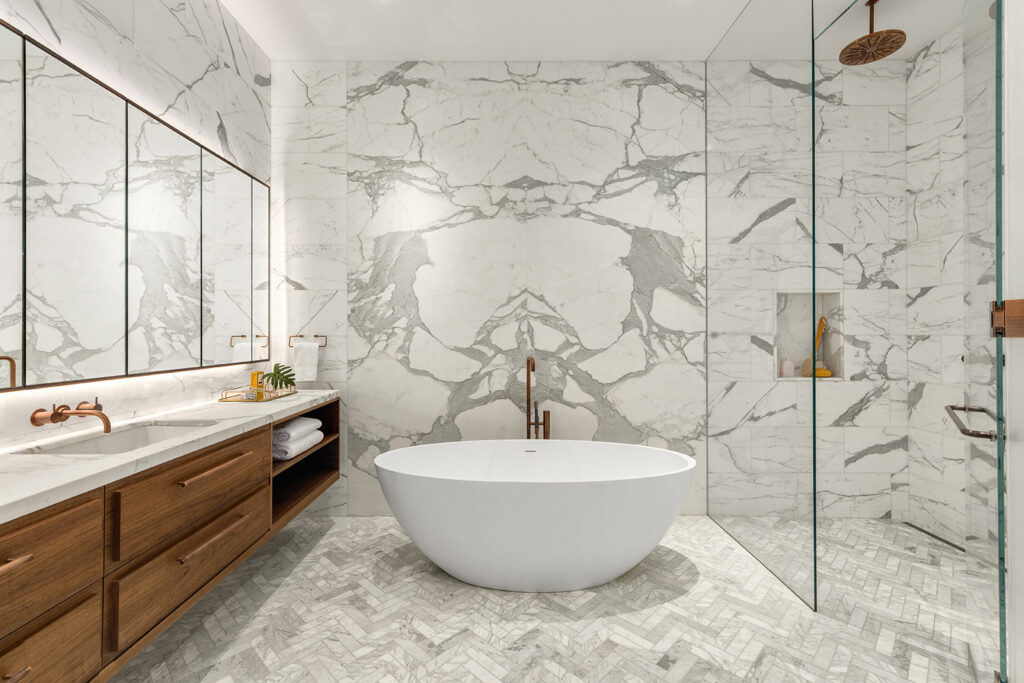
Free material samples and tub templates

Meta: Luxury bathroom accessories can transform an ordinary space into something truly special. These bathroom accessories can spark the luxury

Who doesn’t want a luxurious bathroom? Bathrooms are necessary for any home, so make the space your own with upscale

Shopping for a home is one of life’s most exciting yet daunting milestones. Before diving into the housing market, it’s
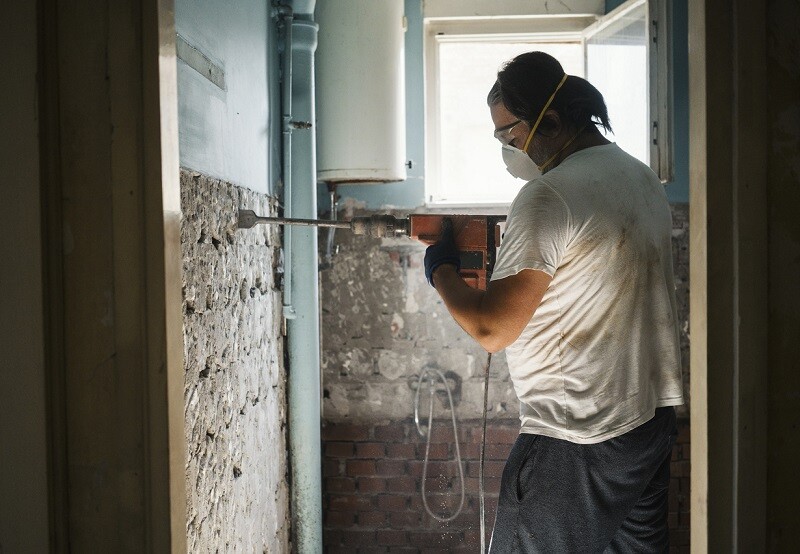
A bathroom remodel can be a fantastic way to upgrade your home, but it can be quite a lengthy and
Fill out the form below to request a free material sample
"*" indicates required fields
"*" indicates required fields